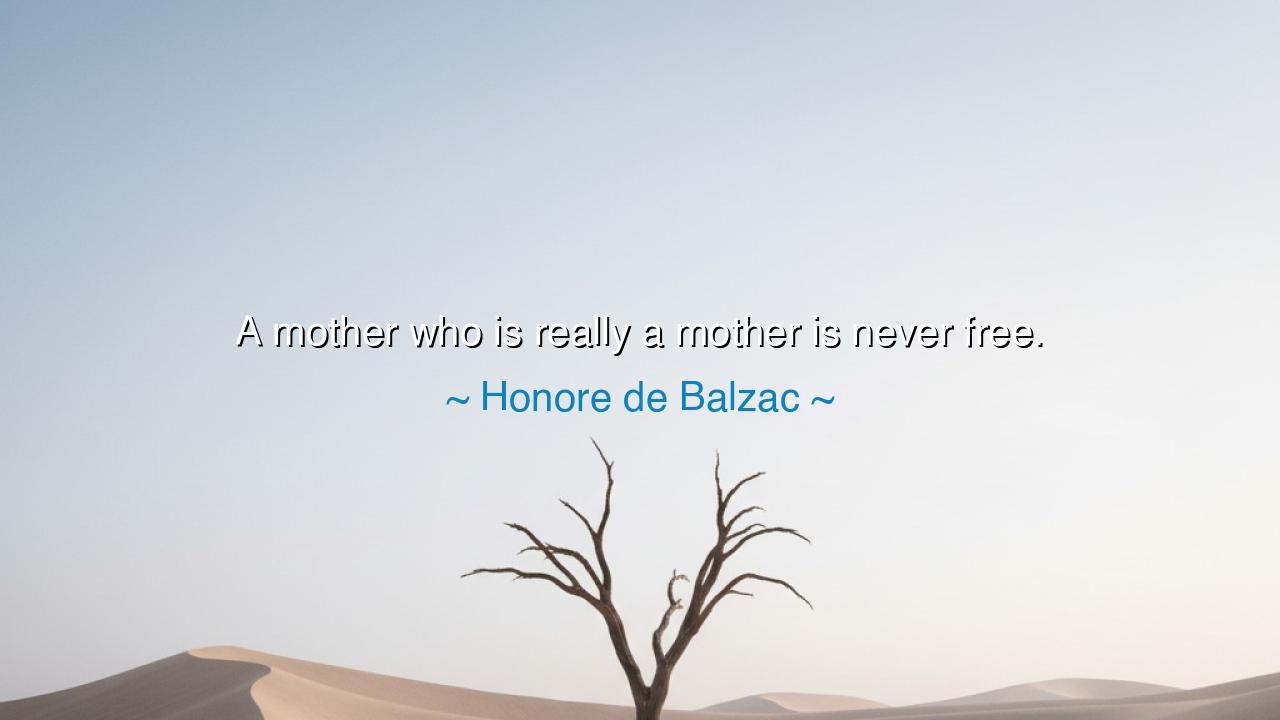
A mother who is really a mother is never free.






In the words of Honoré de Balzac: “A mother who is really a mother is never free.” This declaration is not a chain meant to diminish, but a crown that signifies sacrifice, devotion, and eternal vigilance. It speaks of the profound truth that when a woman embraces the sacred calling of motherhood, she binds her heart and her life to another. From the moment the child first draws breath, the mother ceases to live for herself alone. Her freedom, once untouched, is now transformed into love’s unbreakable bond.
The ancients revered this truth. They knew that the greatness of a people did not lie only in its warriors, its rulers, or its philosophers, but in the unseen devotion of its mothers. For every hero was once a child at the breast, every sage once held in the cradle. The strength of civilizations rested upon the quiet sacrifices of women who gave their days and nights to nurture, to guard, and to guide. In saying that a true mother is never free, Balzac revealed the eternal cost of this sacred duty—once bound to love, she carries it all her days.
Consider the story of Cornelia, the mother of the Gracchi brothers in ancient Rome. When asked by other noblewomen to display her jewels, she pointed instead to her sons and declared, “These are my jewels.” She devoted herself entirely to their upbringing, instilling in them the values of justice and reform that would later shake the Roman Republic. Her life was never her own; it was given wholly to them. And though her sons would meet tragic fates, history remembers Cornelia as the embodiment of maternal devotion, proof of Balzac’s words that a mother is bound forever by love, never truly free.
Yet this lack of freedom is not a prison, but a paradox of love. For in surrendering her freedom, the mother finds a deeper meaning, a higher calling. She becomes the watchful guardian, the healer of wounds, the teacher of first lessons, the silent shield against the world’s cruelties. Freedom for herself is exchanged for security for her child. Sleep, leisure, and personal ambition are all laid upon the altar of love. And yet, in this sacrifice, she discovers joy that transcends all worldly pleasures.
But Balzac’s words also carry weight as a warning. They remind us to honor the hidden labor of mothers, who give without ceasing and whose sacrifice is too often taken for granted. To say a mother is “never free” is not to reduce her life to burden, but to call upon society and family alike to recognize her endless labor. For the bonds of love, though willingly carried, are heavy, and every mother deserves gratitude, respect, and support in her sacred task.
The lesson is clear: do not mistake sacrifice for weakness, nor the loss of freedom for a loss of worth. A true mother is never free because she has chosen to live for something greater than herself. She embodies the strength of selflessness, the endurance of love, and the power of devotion. Her life may no longer be her own, but through her, generations are born, nurtured, and given to the world.
Practical action lies before us: if you are a child, honor your mother not only in word but in deed. Recognize the countless unseen sacrifices that shaped your life. If you are a parent, embrace the truth that love demands surrender, and wear that burden with pride, knowing it gives life its deepest meaning. And if you stand beside a mother—as spouse, sibling, or friend—support her, for though she may not be free, she should never be alone.
Thus, Balzac’s words echo like the wisdom of the ancients: the truest motherhood is a chain of love, freely chosen, yet unbreakable. A mother is never free, and yet in her sacrifice, she is greater than queens, mightier than warriors, and more enduring than empires. For it is upon her devotion that all of humanity builds its future.






AAdministratorAdministrator
Welcome, honored guests. Please leave a comment, we will respond soon